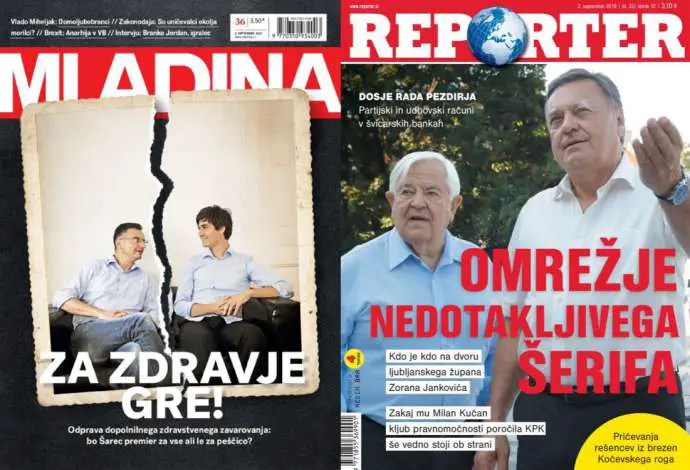The covers and editorials from leading weeklies of the Left and Right for the work-week ending Friday, 06 September
Mladina: Health insurance a difficult problem
STA, 6 September 2019 - The left-leaning weekly Mladina argues in its latest editorial that the system of top-up health insurance in Slovenia is an example of systematic corruption par excellence. It is clear that the lobbies and politicians involved will not give up this money easily, the paper says.
Editor-in-chief Grega Repovž is very sceptical of the message coming from the coalition and the Left - that they have found common ground on abolishing top-up health insurance by folding it into mandatory health insurance.
It is not that their intentions are not sincere, it is simply that health insurance is very much an ideological issue, linked with the opposition New Slovenia (NSi) and its predecessors, SKD and SLS, and the opposition Democrats (SDS), he notes.
Since its introduction the top-up health insurance has been an "additional contribution or tax for healthcare" and health insurers have been acting as "some kind of private tax administration collecting only this tax".
Citizens can seemingly choose which insurer they want - initially there were just two insurers, Adriatic Slovenica and Vzajemna, Triglav entered the marked much later. Adriatic Slovenica was initially let into the game only to disguise the true nature of Vzajemna.
The system, conceived by long-term head of the ZZZS national public health insurance fund, Franc Košir, has subsequently turned out to be one of the worst cases of privatisation of public money ever.
"Vzajemna seemed like the best idea in the world. Its founding was overseen by ZZZS itself." It was conceived as a company whose manager and shareholder becomes anyone who pays the insurance and thus becomes a member. And formally, this still holds true today. "Can anyone even object to this concept?"
But in fact, the legislation was amended already when Vzajemna was founded to allow a group of people manage a part of public funds and it has remained so until this day.
"Vzajemna is controlled by the same lobbies today only the people who run things are different."
Its powers expand beyond any political borders today and stretch into the business world, with the former CEO of poultry producer Perutnina Ptuj, Roman Glaser, holding a great deal of power.
Vzajemna also has some EUR 100 million of reserves in deposits and other financial investments and can invest them in line with the wishes of those who have power.
"It is therefore clear that all these lobbies and lobbyists, hired consultants and also politicians and public office holders work against any government that attempts to sort out this issue. It has been so for the last sixteen years. It is such easy money that nobody will give it up easily," Repovž says under the headline It's Systemic Corruption.
Reporter: Gov’t staffing scandal deserves a closer look
STA, 2 September 2019 - Looking at the downfall of Brane Kralj, the secretary general of the ruling Marjan Šarec List (LMŠ), the right-leaning weekly Reporter says that this is Šarec's first serious mistake since taking office and a signal from networks of power that he should not be too single-minded.
"Nobody is innocent in the political drama that unfolded last week. But it appears this was a carefully planned skirmish involving networks that control state property, whereby Šarec received a rap on the knuckles for the first time," the paper says in Final Warning.
The scandal shows that the government is engaged in the same sort of political staffing as its predecessors. "Prime Minister Šarec cannot say any longer that he is different, that such things do not happen under his watch."
Delving into the details of the fateful call Kralj made to the chief supervisor of the Official Gazette, Irena Prijović, Reporter says DeSUS president Karl Erjavec soliciting the call is less likely than the theory that the chief supervisor of Slovenian Sovereign Holding (SSH), Karmen Dieter, told Kralj to contact Prijović directly.
"Irena Prijović is not a woman that would falter as soon as she gets a call from the secretary general of a ruling party, and neither is she a flawless Virgin Mary. Her statements about 'brutal pressure' have to be taken with a dollop of salt: Prijović is considered the right hand of Borut Jamnik, the greying wonder boy of the (para)state sector, the nephew of the once influential SocDem politician Breda Pečan."
The commentator describes Jamnik and Prijović as having "literally kidnapped corporate governance", weaving a web of power that has political backing from the SocDems. "They are both political appointees and for years they have been wandering from one post in state-owned companies to the other."
"Since Jamnik has grown over politicians' heads, they have clipped his wings and now he is striking back. The Official Gazette scandal is probably revenge for loss of influence at Telekom Slovenije," Reporter says.
Looking at the uncertainty in autumn, with the looming passage of the budget bills and the Left making its support for the minority government conditional on health insurance reform, the paper says the Official Gazette scandal was "a warning of sorts to the prime minister that networks will bring down his government if he is too single-minded".
All our posts in this series are here






